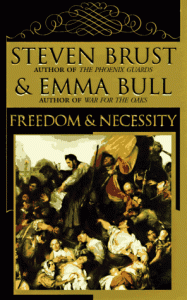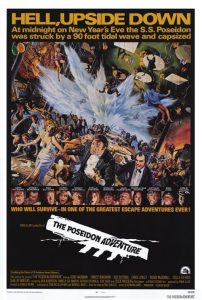As a result of a brief spate of overly long books, I went the short book route again, and might for the next little while. My immediate short book impulse these days is Anita Blake, because there are just so damned many of them and I can never find any Pratchett in the used bookstores. In that Bloody Bones mostly avoided the “How is our heroine’s love life these days?” thing that was starting to grate on me a bit, by virtue of taking the action out of St. Louis and over to beautiful, touristy Branson, I have to call the whole thing a rousing success.
I mean, okay, calling any of them a rousing success is perhaps overstating the case, but it’s nice to see some variation repairing the only real flaw in what’s been a nice bit of fluff over the past many months. This was an earlier edition than what I’m used to seeing, and the typos were mysteriously vanished. So I’m inclined to blame the new publisher a lot, now; if you insert new typos into future editions of a book that didn’t originally have them? That’s just sad. Most of the rest of what I have appear to be the not as good editions, but having solved the mystery, I probably won’t complain about it anymore. So there’s that. Plus, mystery-solving, look at me getting all kinshippy with the necromantic vampire-slayer chick.
So, what does this entry in the series have, relative to the others? Murders, as usual. Zombies, as usual. Vampires, as usual. Faeries, which is new. A different set of cops than usual, thanks to the jurisdictional change mentioned above. An apprentice vampire slayer, definitely new, but a welcome addition to the cast. More Anita-on-$Magical_Creature action than usual, but sure, that was always on the horizon from day one. Random vampire fetish games designed to squick our heroes, which was… well, kind of out of left field, but I suppose I need to be ready for that as the series progresses, so alright. Something approximating zombie sex, about which I will add little in order to not incriminate myself. (It failed to be nearly as hot as it should have been. Disillusioning!) Oh, and for once the mystery part was not completely interconnected from the get go, which change I like. The plots were starting to get a little too pat, despite how cleverly executed.
 I think I may be getting bad at this. At least, lately I’ve been at a loss for descriptive words. In this case, my lack is for how to describe
I think I may be getting bad at this. At least, lately I’ve been at a loss for descriptive words. In this case, my lack is for how to describe  I thought I ought to ground myself in history, so thanks to my good friends at Netflix, I snagged
I thought I ought to ground myself in history, so thanks to my good friends at Netflix, I snagged